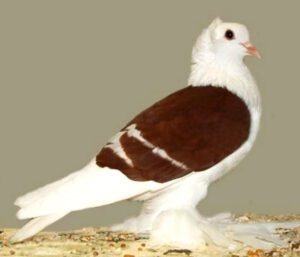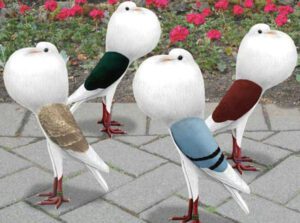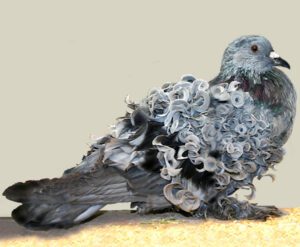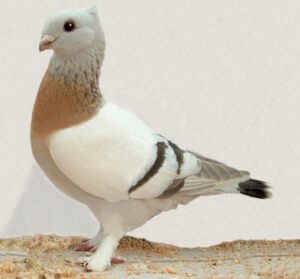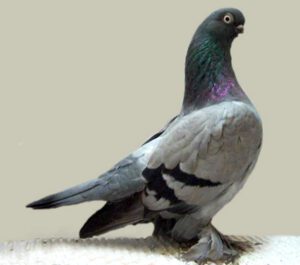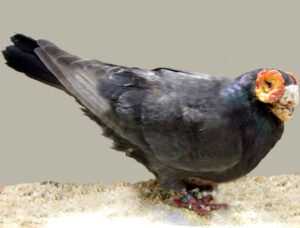The Oriental Frill pigeon is a breed of fancy pigeon which was developed over many years of selective breeding. It is also known by some other names such as Hünkari; Classic Oriental Frill, Old Style or Old Fashioned Frill (“classic” style Oriental Frills only).
It is called Hünkari in it’s homeland. Meaning of the word ‘Hünkari‘ is the bird of Sultans. It is originally a Turkish pigeon breed which is specially bred for the Ottoman Sultans in the Manisa Palace, Turkey.
The Manisa is an old Ottoman city in the Western Turkey. The breed is actually divided into several color variations and markings. But the Blondinettes and Satinettes are the most common variety.
The Oriental Frill pigeon was developed from the Old Fashioned Oriental Frill pigeon. And the original form of this bird is still preserved as the Old Fashioned Oriental Frill.
The breed was introduced into the United Kingdom it 1864 from Smyrna. The breed is actually noted for it’s very short beak and rounded heads. However, read some more information about the breed below.
Oriental Frill Pigeon Characteristics
Oriental Frill pigeon is a small sized bird with beautiful appearance. The breed is noted especially for it’s very short beak and rounded heads.
These birds have frill of feathers on their breast. They have a dapper peaked crest on the highest point of their head. There are many beautiful color varieties of these birds.
But the most popular and common color varieties are Blondinettes and Satinettes. A Satinette is a mostly white bird, including the body, face, legs, and even the primary flight feathers.
While the Blondinettes can have another basic color, often blue, in those areas. The shoulders, wing coverts, and tail are then patterned to show a wonderful contrast with the ground color.
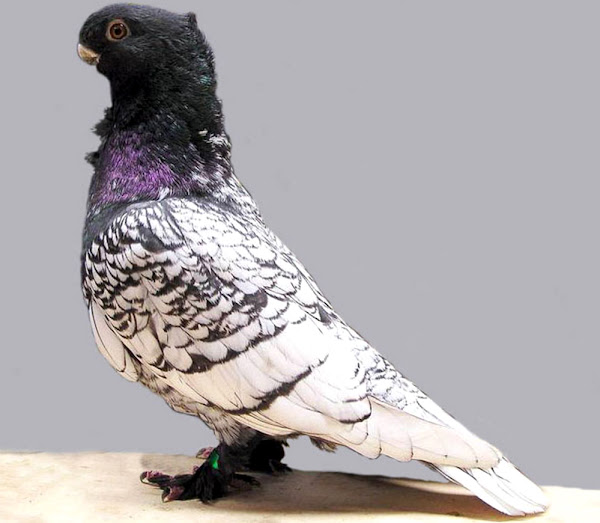
Average body height of the mature Oriental Frill pigeon is about 33 cm. And their average mature body weight is between 310 and 340 grams. Photo and info from RightPet and Wikipedia.
Uses
The Oriental Frill pigeon is used for show and ornamental purposes. It is also very good as pets.
Special Notes
The Oriental Frill pigeon is small and sweet bird. It is good for show purpose and also very good for oriental purpose. But it is highly regarded as an affectionate pet that will follow it’s keeper around.
It is not wise to leave these lovely, social and friendly birds alone and isolated.
Average lifespan of this pigeon breed can be 7 to 10 years, if properly cared. However, review full breed profile of these birds in the following chart.
| Breed Name | Oriental Frill |
| Other Name | Hünkari; Classic Oriental Frill, Old Style or Old Fashioned Frill (“classic” style Oriental Frills only) |
| Breed Purpose | Show, ornamental and pets |
| Special Notes | Beautiful birds, small and sweet, good for show, good for oriental purpose, highly regarded as an affectionate pet, friendly, social, lovely |
| Breed Class | Small |
| Weight | 310 to 340 grams |
| Climate Tolerance | Native climates |
| Flying Ability | Good |
| As Pets | Very good |
| Color | Many |
| Rarity | Common |
| Country/Place of Origin | Turkey |

